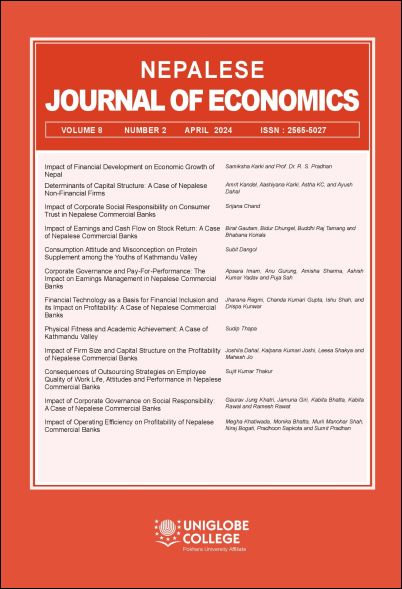Impact of Earnings and Cash Flow on Stock Return: A Case of Nepalese Commercial Banks
DOI:
https://doi.org/10.3126/nje.v8i2.68804Keywords:
market price per share, stock return, earnings per share, net income, return on equity, cash flow from operating activities, cashflow from investing activities, cash flow from financing activitiesAbstract
This study examines the impact of earnings and cash flow on stock return in the context of Nepalese commercial banks. Stock return and market price per share are selected as the dependent variables. The selected independent variables are net income, total equity, earnings per share, return on equity, cash flow from operating activities, cash flow from investing activities and cash flow from financing activities. The study is based on secondary data of 10 commercial banks with 100 observations for the period from 2012/13 to 2021/22. The data were collected from Bank Supervision Report published by Nepal Rastra Bank (NRB) and annual reports of the selected commercial banks. The correlation coefficients and regression models are estimated to test the significance and importance of earnings and cash flow on stock return in the context of Nepalese commercial banks.
The study showed that return on equity has a positive effect on stock return and market price per share. It indicates that higher the return on equity, higher would be the stock return and market price per share. Similarly, total equity has a positive effect on stock return. It implies that increase in total equity, leads to increase in stock return. Moreover, net income has a positive effect on market price per share. It means that increase in net income leads to increase in market price per share. Similarly, the result also showed that there is a negative impact of cash flow from investing activities on stock return and market price per share. It indicates that increase in cash flow from investing activities leads to decrease in stock return and market price per share. Furthermore, there is a negative impact of cash flow from financing activities on stock return and market price per share. It indicates that increase in cash flow from financing activities leads to decrease in stock return and market price per share.




